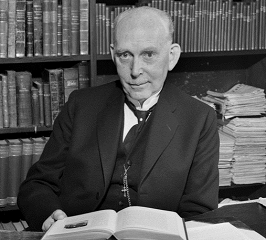The Lord be with you
 Martin Luther’s Small Catechism follows each of the Ten Commandments with the question, “What does this mean?” The answers all begin with, “We should fear and love God …” except the answer to the First Commandment which says “We should fear, love and trust God …” Most American’s have little trouble agreeing with the idea that we should love God or trust God, but aren’t too comfortable with the idea that we should fear God. Ole Hallesby, a twentieth century Norwegian Lutheran theologian, has some provocative thoughts about this deficit in our contemporary spiritual composition.
Martin Luther’s Small Catechism follows each of the Ten Commandments with the question, “What does this mean?” The answers all begin with, “We should fear and love God …” except the answer to the First Commandment which says “We should fear, love and trust God …” Most American’s have little trouble agreeing with the idea that we should love God or trust God, but aren’t too comfortable with the idea that we should fear God. Ole Hallesby, a twentieth century Norwegian Lutheran theologian, has some provocative thoughts about this deficit in our contemporary spiritual composition.
In his explanation of the commandments, Luther begins every one with these words, “We should fear and love God and …”
It is perhaps well known that there are some Christians today who maintain that Luther made a mistake in this. They strike out the “fear” and say that we should love God, nothing more.
But when the people of our superficial generation have read the Bible as thoroughly as Luther did, they will see that Luther was right also in this.
He has seen clearly that love to God does not exclude fear, but that they mutually strengthen each other.
He has seen that there is something about love which is to be feared. He has seen that there is something about grace which is dangerous. He has seen the risk connected with grace, yea, that in the last instance nothing is more dangerous than the grace of God.
It is part and parcel of the risk connected with life as a whole.
The greater the good in life, the more dangerous it becomes to us, if we misuse it. And since the grace of God is life’s most precious good, grace is more dangerous than anything else in the world, if we misuse it.
The psalmist saw this more than two thousand years ago when he said, “Blessed is the man unto whom the Lord imputeth not iniquity, and in whose spirit there is no guile” (Psalm 32:2).
This is the precipitous chasm which runs along the narrow way to the very end—to our dying breath. As long as a Christian is watchful and keeps his eye on the chasm, he will continue to live in “fear and trembling,” as the apostle admonishes us to do.
Ole Hallesby (1879-1961)
Under His Wings
My source: For All the Saints, year 1, volume 2 (398-399)
The Christian Cyclopedia has the following article about Hallesby. I have slightly expanded it (filling out abbreviations mainly) to make it easier to read. Click on the words “Christian Cyclopedia” to find this resource on-line.
Erlangen; professor of systematic theology, free faculty, Oslo, 1909–51; leader of free faculty and conservative theologians; opposed German occupation during WWII; arrested and placed in concentration camp 1943 remaining there until the end of the war. Works include a dogmatics (Den kristelige troslaere) and ethics (Den kristelige sedelaere); works translated into English include Infant Baptism and Adult Conversion; Temperament and the Christian Faith; Under His Wings; Religious or Christian; Prayer; Conscience; The Christian Life in the Light of the Cross.
Blessings in Christ,
Pastor Rickert
